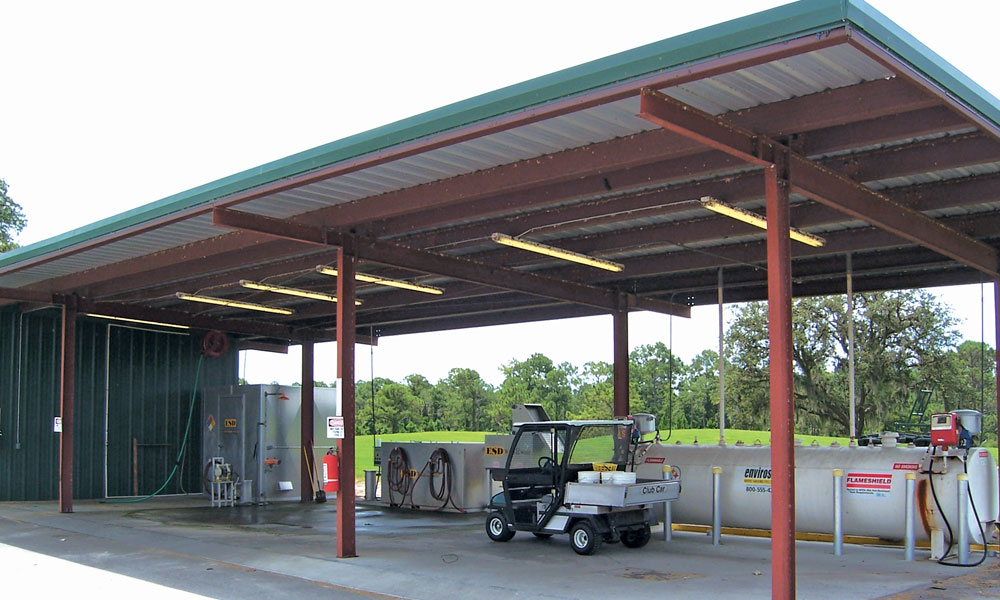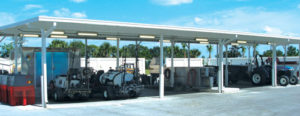Golf Course Maintenance Best Management Practices


There has been increased focus on identified waste streams generated from Golf Course Maintenance Facilities over the years. Maintenance Equipment from fairway mowers to utility carts need to be washed after coming off the course to remove grass clippings, oil, grease and chemical residue such as phosphorous.
Golf Course Maintenance Best Management Practices
Best Management Practices recommend the following:
I. Identify and isolate potential contaminant from soil and water
II. Only clean storm water should be discharged into surface body of water –
Wash Water should be discharged to the Sanitary Sewer (POTW) or be recycled
III. Minimize irrigation, fertilizer and pesticide use requirements through use of Integrated Best Management and native vegetation wherever possible
Let’s explore Practices I. and II. in further detail.
Practice I: Identify and Isolate.


The Founder’s Club Sarasota, FL
Identifying a generated waste stream is relatively easy to define. A waste stream assessment is the process of understanding the mix of material in the local waste stream. A waste stream assessment can be as simple as evaluating existing data that a local government already keeps or it may include an extensive waste sort to estimate quantities of various materials in the waste stream. In a Golf Maintenance Facility, the waste stream generated from:
- Washing Equipment Area – includes clipping (organic) separation, wash water generation from equipment cleaning
- Fueling Area – Requirements: secondary containment (always consult local authorities for rules and regulations)
- Chemical mix / load Area – Requirements: proper storage ventilation with air exchange, Emergency Eye-wash & Shower and secondary containment
Creating a Course Maintenance Waste Stream Assessment should include an overall review of process and procedures to maximize facility efficiency. An efficient Option is to create an Environmental Center. This design concept houses the (3) identified waste stream generators in one centralized area. The Process Flow has Maintenance Operators return to the Maintenance Facility where fueling and equipment washing can occur prior to storage saving time from moving from one side of the yard to another. It also limits liability exposure restricting all potentially harmful activities to a contained area.
Practice II: Discharge or Recycle.
Environmental regulations prohibit the direct discharge of industrial process water directly to the environment without permits. For many types of non-exempt small volume discharges, the permitting process involves enough expense and difficulty that it effectively prohibits such discharges. As equipment is washed grease, oil or a wide variety of soils are generated that require some type of waste water treatment system to comply with environmental regulations. Although there may not be problems with environmental regulators today, the Course may in the future come across serious problems and may even be liable for heavy fines. Treatment equipment is often necessary to guarantee that pollutants are not passed into the environment along with wash water.
Federal, state and local environmental regulations require that the waste stream from turf maintenance operations be properly managed. The combined impact of environmental regulations and the increase in public awareness of environmental issues that threaten the environment are only two good reasons that it makes less and less economic sense for un-managed waste streams. Golf courses or any other facility with a major turf maintenance operation represents a substantial investment in real estate. Today, preservation of the value of real property means not only protection of the property from contamination, but documentation of positive efforts and programs to protect the property from pollution, especially if any hazardous materials are handled on the property.
If Sanitary Sewer is not accessible or water conservation is a goal, a Closed Loop Recycle System is recommended to treat the wash water prior to being returned to a hose outlet. Contaminants can be removed and disposed of as solids, and the treated water reused for washing.
A few items to consider when reviewing a Closed Loop Recycle System:
- Ease of Operation
- Water Conservation
- Consumable costs
- Recycled Water Quality
- Number of Operators that will be using the system per day
- Equipment Footprint Size
- Utility Requirements
- Permanent Concrete Slab Design or Above Ground Wash Pad
- Expected Equipment Life Cycle
In closing, to avoid the environmental liability of a spill or one source discharge identifying the source is the first crucial piece of the puzzle. Educating and planning for the future will ensure a safe and compliant Maintenance Facility.
Recent Posts
The Rare Condor: What It Means for Golf and the Course Maintenance Behind It
Imagine this: you're on a par-5, having just hit your second shot toward the green.…
DENIOS Under Bench Cabinet Provides Safe Storage of Lithium-Ion Batteries
DENIOS introduces asecos under bench cabinets for the safe storage of undamaged lithium-ion batteries. They…
True Blue Golf Club, One of America’s Top 100 Resort Courses, Acquires Steve Dresser Golf Academy
True Blue Golf Club has acquired the Steve Dresser Golf Academy, a renowned instructional facility…
Memphis Country Club: A Golfer’s Study in Precision and Tradition
If you have ever teed it up at Memphis Country Club, you know this isn’t…
Superintendents Online Turf Directory – EVERYTHING TURF
Our online directory, directory.GolfCourseTrades.com is the go-to resource for the busy superintendent. It is your opportunity…
Foley Company attains GCSAA Silver Partner Status
Foley Company, a leader in turf equipment innovation and technology, affirms its support of the…


